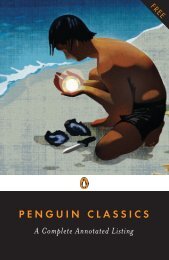- Page 1:
PENGUIN CLASSICS A Complete Annotat
- Page 5:
Penguin ClassiCs A Complete Annotat
- Page 9:
Contents Penguin ClassiCs 1 (arrang
- Page 12 and 13:
john adaMs 1735 - 1826, american ab
- Page 14 and 15:
jaMes agee 1909 - 1955, american A
- Page 16 and 17:
Little Women Edited with an Introdu
- Page 18 and 19:
Mulk raj anand 1905 - 2004, indian
- Page 20 and 21:
aPPian c. 2nd cent. a.d., greek The
- Page 22 and 23:
ludoviCo ariosto 1474 - 1533, itali
- Page 24 and 25:
The Politics Translated with an Int
- Page 26 and 27:
Pride and Prejudice Edited with Int
- Page 28 and 29:
honoré de balzaC 1799 - 1850, Fren
- Page 30 and 31:
j. M. barrie 1860 - 1937, scottish
- Page 32 and 33:
ede c. 673 - 735, anglo-saxon brend
- Page 34 and 35:
Herzog Introduction by Philip Roth
- Page 36 and 37:
éroul c. 12th cent., French The Ro
- Page 38 and 39:
anCius boethius c. 480 - 524, Roman
- Page 40 and 41:
Poems of the Night A Dual-Language
- Page 42 and 43:
ertolt breCht 1898 - 1956, german T
- Page 44 and 45:
Jane Eyre Edited with an Introducti
- Page 46 and 47:
WilliaM hill broWn 1765 - 1793, ame
- Page 48 and 49:
The Master and Margarita Translated
- Page 50 and 51:
Journals and Letters Edited by Pete
- Page 52 and 53:
luis vaz de CaMÕes 1525 - 1580, Po
- Page 54 and 55:
angela Carter 1940 - 1992, american
- Page 56 and 57:
george Catlin 1796 - 1872, american
- Page 58 and 59:
Exemplary Stories Translated with a
- Page 60 and 61:
Cesar Chavez 1927 - 1993, american
- Page 62 and 63:
Charles W. Chesnutt 1858 - 1932, am
- Page 64 and 65:
Winston ChurChill 1874 - 1965, engl
- Page 66 and 67:
Wilkie Collins 1824 - 1889, english
- Page 68 and 69:
A Study in Scarlet With an Introduc
- Page 70 and 71:
Typhoon and Other Stories Edited wi
- Page 72 and 73:
MalColM CoWley 1898 - 1989, america
- Page 74 and 75:
e. e. CuMMings 1894 - 1962, america
- Page 76 and 77:
ubén darÍo 1867 - 1916, nicaragua
- Page 78 and 79:
Italian Food Foreword by Julia Chil
- Page 80 and 81:
don delillo b. 1936, american White
- Page 82 and 83:
David Copperfield Introduction and
- Page 84 and 85:
The Pickwick Papers Edited with an
- Page 86 and 87:
Crime and Punishment Translated wit
- Page 88 and 89:
Narrative of the Life of Frederick
- Page 90 and 91:
The Women’s War Translated and Ed
- Page 92 and 93:
Daniel Deronda Edited with an Intro
- Page 94 and 95:
ePiCtetus c. 55 a. D. - 135 a.D. *D
- Page 96 and 97:
eusebius c. 260 - c. 339, Palestini
- Page 98 and 99:
Fanny Fern 1811 - 1872, american Ru
- Page 100 and 101:
Madame Bovary Translated with an In
- Page 102 and 103:
A Room with a View Edited with an I
- Page 104 and 105:
sigMund Freud 1856 - 1939, austrian
- Page 106 and 107:
WilliaM gaddis 1922 - 1998, america
- Page 108 and 109:
North and South Edited with an Intr
- Page 110 and 111:
The History of the Decline and Fall
- Page 112 and 113:
WilliaM godWin 1756 - 1836, english
- Page 114 and 115:
eMMa goldMan 1869 - 1940, american
- Page 116 and 117:
henry green 1905 - 1973, english
- Page 118 and 119:
The Man Within Introduction by Jona
- Page 120 and 121:
She Edited with an Introduction by
- Page 122 and 123:
Far from the Madding Crowd Edited w
- Page 124 and 125:
Tess of the D’Urbervilles Hardy
- Page 126 and 127:
jaroslav hasˇek 1883 - 1923, Czech
- Page 128 and 129:
george herbert 1593 - 1633, english
- Page 130 and 131:
ernst theodor hoFFMann 1776 - 1822,
- Page 132 and 133:
anthony hoPe 1863 - 1933, english T
- Page 134 and 135:
david huMe 1711 - 1776, scottish Di
- Page 136 and 137:
Hedda Gabler and Other Plays Transl
- Page 138 and 139:
jens Peter jaCobsen 1847 - 1885, Da
- Page 140 and 141:
The Portrait of a Lady Edited with
- Page 142 and 143:
thoMas jeFFerson 1743 - 1826, ameri
- Page 144 and 145:
saMuel johnson 1709 - 1784, english
- Page 146 and 147:
Dubliners Introduction and Notes by
- Page 148 and 149: ka - lida - sa c. 1st millennium B.
- Page 150 and 151: On the Road Introduction by Ann Cha
- Page 152 and 153: udyard kiPling 1865 - 1936, english
- Page 154 and 155: Charles laMb 1775 - 1834, english M
- Page 156 and 157: Complete Poems Collected and Edited
- Page 158 and 159: Women in Love Cambridge Lawrence Ed
- Page 160 and 161: MeriWether leWis 1774 - 1809, ameri
- Page 162 and 163: The Cruise of the Snark Edited with
- Page 164 and 165: luCian c. 125 - c. 200, Roman (b. s
- Page 166 and 167: The Prince Revised Translation by G
- Page 168 and 169: alessandro Manzoni 1785 - 1873, ita
- Page 170 and 171: andreW Marvell 1621 - 1678, english
- Page 172 and 173: Peter Matthiessen b. 1927, american
- Page 174 and 175: Of Human Bondage Introduction by Ro
- Page 176 and 177: Moby-Dick Or, The Whale Edited with
- Page 178 and 179: thoMas Middleton c. 1580 - 1627, en
- Page 180 and 181: The Man Who Had All the Luck Introd
- Page 182 and 183: Marianne Moore 1887 - 1972, america
- Page 184 and 185: Multatuli 1820 - 1887, Dutch Max Ha
- Page 186 and 187: obert MusIl 1880 - 1942, german The
- Page 188 and 189: e. NesbIt 1858 - 1924, english “[
- Page 190 and 191: Beyond Good and Evil Translated by
- Page 192 and 193: euGeNe o’NeIll 1888 - 1953, ameri
- Page 194 and 195: *Complete Poems Introduction by Mar
- Page 196 and 197: FerNaNdo pessoa 1888 - 1935, portug
- Page 200 and 201: *Timaeus and Critias Translated by
- Page 202 and 203: Makers of Rome Translated with an I
- Page 204 and 205: JohN wesley powell 1834 - 1902, ame
- Page 206 and 207: pu soNGlING 1640 - 1715, chinese St
- Page 208 and 209: JeaN racINe 1639 - 1699, French Iph
- Page 210 and 211: arthur rIMbaud 1854 - 1891, French
- Page 212 and 213: edMoNd rostaNd 1868 - 1918, French
- Page 214 and 215: JohN rusKIN 1819 - 1900, english Un
- Page 216 and 217: doMINGo F. sarMIeNto 1811 - 1888, a
- Page 218 and 219: Ivanhoe Edited with an Introduction
- Page 220 and 221: Four Tragedies and Octavia Translat
- Page 222 and 223: King Lear (The Quarto and the Folio
- Page 224 and 225: GeorGe berNard shaw 1856 - 1950, ir
- Page 226 and 227: Mary shelley 1797 - 1851, english F
- Page 228 and 229: uptoN sINclaIr 1878 - 1968, america
- Page 230 and 231: Ichard peNN sMIth 1790 - 1854, amer
- Page 232 and 233: Kusamakura Translated with an Intro
- Page 234 and 235: JohN steINbecK 1902 - 1968, america
- Page 236 and 237: The Log from the Sea of Cortez Intr
- Page 238 and 239: Travels with Charley in Search of A
- Page 240 and 241: The Master of Ballantrae Edited wit
- Page 242 and 243: Uncle Tom’s Cabin Or, Life Among
- Page 244 and 245: corNelIus tacItus c. 56 - c. 120, R
- Page 246 and 247: wIllIaM MaKepeace thacKeray 1811 -
- Page 248 and 249:
thucydIdes c. 460 - c. 400 b.c., gr
- Page 250 and 251:
How Much Land Does a Man Need? and
- Page 252 and 253:
Can You Forgive Her? Edited with an
- Page 254 and 255:
soJourNer truth c. 1797 - 1883, ame
- Page 256 and 257:
A Connecticut Yankee in King Arthur
- Page 258 and 259:
sIGrId uNdset 1882 - 1949, norwegia
- Page 260 and 261:
Lives of the Artists Volume 2 Trans
- Page 262 and 263:
Aeneid Edited by Frederick M. Keene
- Page 264 and 265:
Micromégas and Other Short Fiction
- Page 266 and 267:
The Country of the Blind and Other
- Page 268 and 269:
The War in the Air Introduction by
- Page 270 and 271:
Summer Introduction and Notes by El
- Page 272 and 273:
oscar wIlde 1854 - 1900, irish The
- Page 274 and 275:
Mary wollstoNecraFt 1759 - 1797, en
- Page 276 and 277:
JohaNN wyss 1743 - 1818, swiss The
- Page 278 and 279:
zItKala- ˇ sa 1876 - 1938, america
- Page 280 and 281:
Beowulf A Verse Translation Transla
- Page 282 and 283:
Gisli Sursson’s Saga and The Saga
- Page 284 and 285:
Orkneyinga Saga The History of the
- Page 286 and 287:
Sagas of Warrior-Poets Edited with
- Page 288 and 289:
The Tibetan Book of the Dead First
- Page 290 and 291:
Classical Literary Criticism Transl
- Page 292 and 293:
Early American Writing Edited with
- Page 294 and 295:
Hindu Myths Translated with an Intr
- Page 296 and 297:
The Penguin Book of First World War
- Page 298 and 299:
The Portable American Realism Reade
- Page 300 and 301:
The Portable Sixties Reader Edited
- Page 302 and 303:
The Talmud A Selection Translated w
- Page 304 and 305:
Ulysses S. Grant Personal Memoirs T
- Page 306 and 307:
As You Like It The Comedy of Errors
- Page 308 and 309:
Geoffrey of Monmouth The History of
- Page 310 and 311:
George Eliot Selected Esssays, Poem
- Page 312 and 313:
Frances Burney Evelina Edgar Rice B
- Page 314 and 315:
The Idiot Netochka Nezvanova Notes
- Page 316 and 317:
Frances Ellen Watkins Harper Iola L
- Page 318 and 319:
The Dreams in the Witch House and O
- Page 320 and 321:
Guy Mannering The Heart of Midlothi
- Page 322 and 323:
H.G. Wells Ann Veronica The Country
- Page 324 and 325:
François de La Rochefoucauld Maxim
- Page 326 and 327:
D. H. Lawrence Complete Poems Selec
- Page 328 and 329:
William James The Varieties of Reli
- Page 330 and 331:
The Adventures of Augie March by Sa
- Page 332 and 333:
YEAR WINNER LIfE DATES NATIONALITY
- Page 334 and 335:
The Arabian Nights: Tales of 1001 N
- Page 336 and 337:
Sidney, Sir Phillip Spenser, Edmund
- Page 338 and 339:
Brown, William Hills Brown, William
- Page 340 and 341:
• Shop for classics online and bu
- Page 342 and 343:
Cranford Elizabeth Gaskell Great Ex
- Page 344 and 345:
Penguin Classics Deluxe Editions SA
- Page 346 and 347:
Penguin Classics Deluxe Editions wi
- Page 348 and 349:
viKing avaiLabLe from vikiNg A fres
- Page 350 and 351:
340 TITLE INDEX TiTle index
- Page 352 and 353:
Bayou Folk and A Night in Acadie ..
- Page 354 and 355:
Curious Case of Benjamin Button and
- Page 356 and 357:
Fragments (Heraclitus) ............
- Page 358 and 359:
Jugurthine War and The Conspiracy o
- Page 360 and 361:
Miss Ravenel’s Conversion from Se
- Page 362 and 363:
Physiology of Taste, The ..........
- Page 364 and 365:
Roughing It........................
- Page 366 and 367:
T Ta Hsüeh and Chung Yung ........
- Page 368:
Women’s War, The ................
















